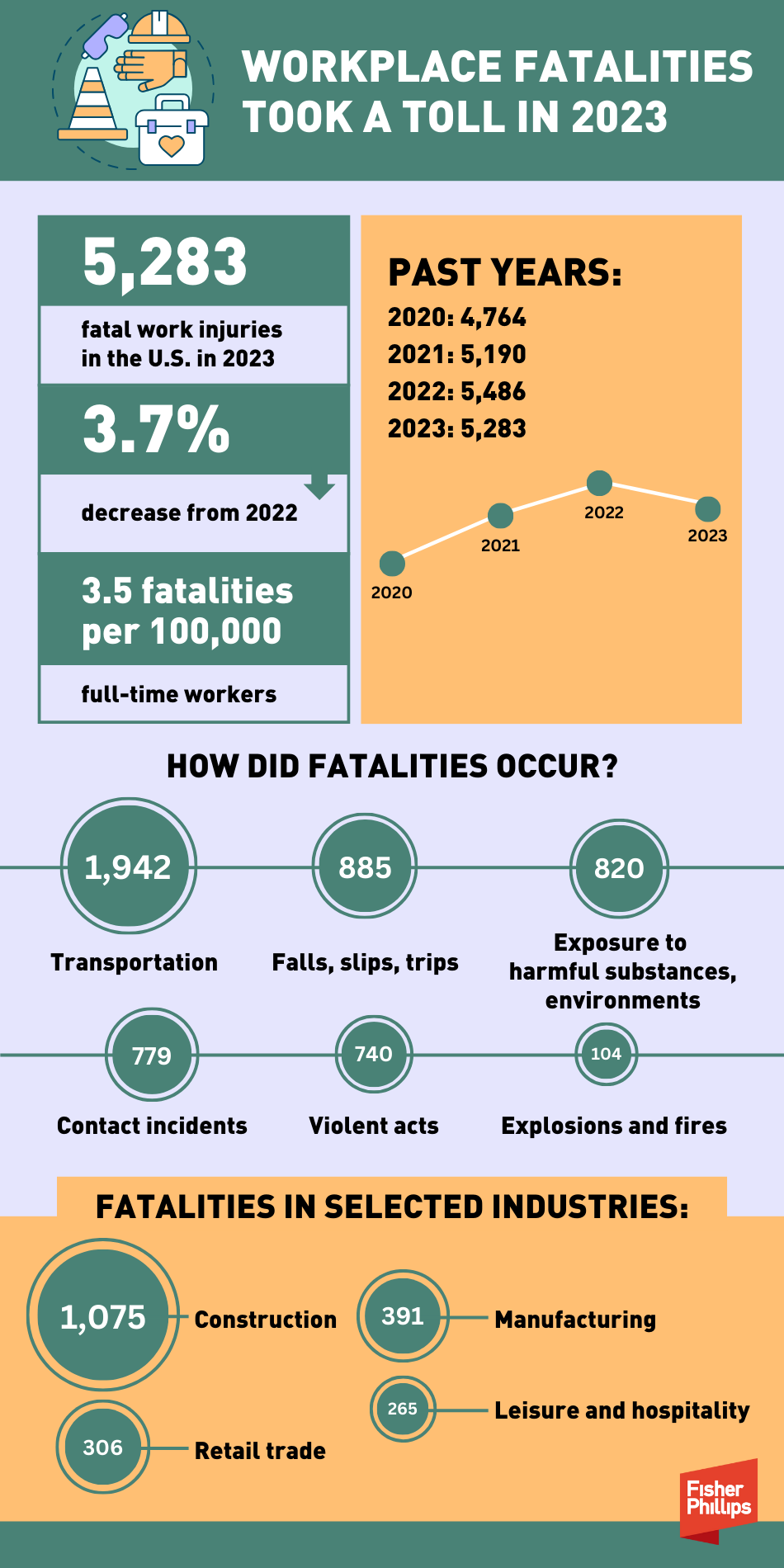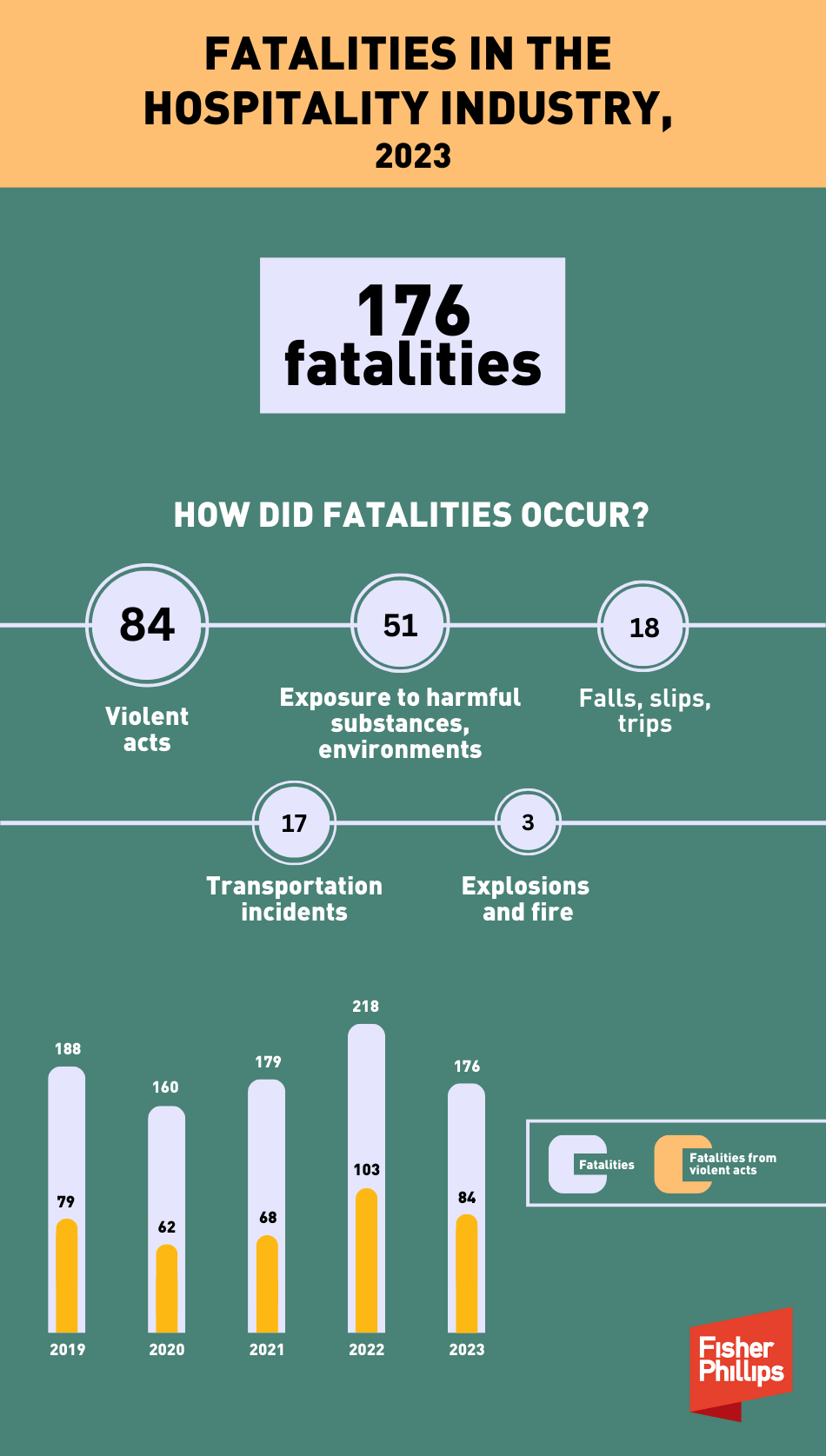Recently released statistics revealed that over 250 workers in the hospitality industry were killed on the job in the most recent reporting year, demonstrating once again that employers need to take safety seriously. According to the December 19 government release, the leading cause of workplace fatalities among restaurant and lodging workers was violent acts, accounting for close to 50% of all deaths. This Insight dives deeper into the numbers and provides hospitality employers with 10 steps you can take to help avoid workplace violence in the near year.
Workplace Fatalities Recap
Before we dive into industry-specific figures, here is an infographic providing some basic data across all fields for 2023. If you want to explore further, the raw data from the government can be found here.

Hospitality Industry Detail
Diving deeper into the hospitality industry, the following infographic tells the tale of an industry that should take safety seriously. For the purposes of this chart, we’ll focus just on those workers in the restaurant and lodging space.

What Can Hospitality Employers Do to Prevent Workplace Fatalities?
Here are a set of 10 recommendations to help hospitality employers prevent workplace violence at their properties. OSHA also provides specific resources related to workplace violence prevention if you want a deeper dive on the subject.
- Establish a Zero-Tolerance Workplace Violence Policy
Clearly communicate (in writing) and enforce a policy that prohibits any form of violence or threats. Train managers to recognize and address violations immediately. - Implement Security Measures for High-Risk Workers
Equip front desk areas, cash handling locations, and entry points with surveillance cameras, panic buttons, and barriers to protect front-line employees in high-risk areas. Also consider panic buttons for housekeepers, room attendants, in-room dining servers, and others who need to enter guest rooms. - Train Employees on Violence Prevention and De-Escalation
Provide training on recognizing warning signs, de-escalating conflicts, and safely exiting dangerous situations. Ensure employees know when and how to seek help. - Control Access to Premises
Use keycards, guest logs, and secure entrances to limit unauthorized access to employee-only and sensitive areas. Restrict after-hours entry to prevent intrusions. - Ensure Adequate Lighting in All Areas
Illuminate parking lots, hallways, kitchens, and back exits to deter criminal activity and make employees feel safer, particularly during night shifts. - Develop a Workplace Violence Prevention Program
Create a detailed plan that addresses potential scenarios, response protocols, and recovery support for affected employees. Make this a part of regular safety reviews. - Secure Financial Transactions
Limit cash handling by encouraging credit or digital payments, and train employees never to resist during a robbery. Install safes and use automated cash management systems. - Hire or Partner with Security Professionals
Employ trained security staff or collaborate with local security firms to monitor entrances, patrol premises, and respond to threats, especially during peak hours or events. - Foster a Culture of Open Communication
Encourage employees to report suspicious behavior, escalating tensions, or security concerns without fear of retaliation. Act on reports swiftly and transparently. - Collaborate with Local Law Enforcement
Work with local police to conduct risk assessments, hold safety workshops, and ensure rapid response protocols. Consider hosting on-site law enforcement training sessions.
Conclusion
We will monitor developments in this area and provide updates as warranted. Make sure you are subscribed to Fisher Phillips’ Insight System to get the most up-to-date information. If you have any questions, contact the author of this Insight, your Fisher Phillips attorney, or any member of our Workplace Safety or Hospitality Industry groups.
About the authors:
Andria Ryan is a partner in the Atlanta office and serves as co-chair of the Hospitality Industry Group. She represents employers in virtually every area of employment and labor law and received the Anthony G. Marshall Hospitality Award for her pioneering and lasting contributions to the field of hospitality law.
Andria represents employers throughout the United States in defending employment discrimination and harassment cases as well as handling traditional labor matters such as unfair labor practices and union campaigns.
Alden Parker is the managing partner of the firm’s Sacramento office and the co-chair of the Hospitality Industry Group. Alden represents employers in all facets of employment law matters. His clients are involved in a variety of food chain related industries. From growers, packers, and shippers to grocers, restaurants and hotels, Alden works tirelessly on behalf of employers from the farm to the fork.
Kristin R.B. White is a partner in the firm’s Denver office, co-chair of the firm’s Workplace Safety and Catastrophe Management Practice Group and chair of the firm’s Energy Industry Team. Kristin counsels and defends clients in regulatory workplace safety matters, and often acts as crisis management counsel for employers across all industries.




Leave a Reply